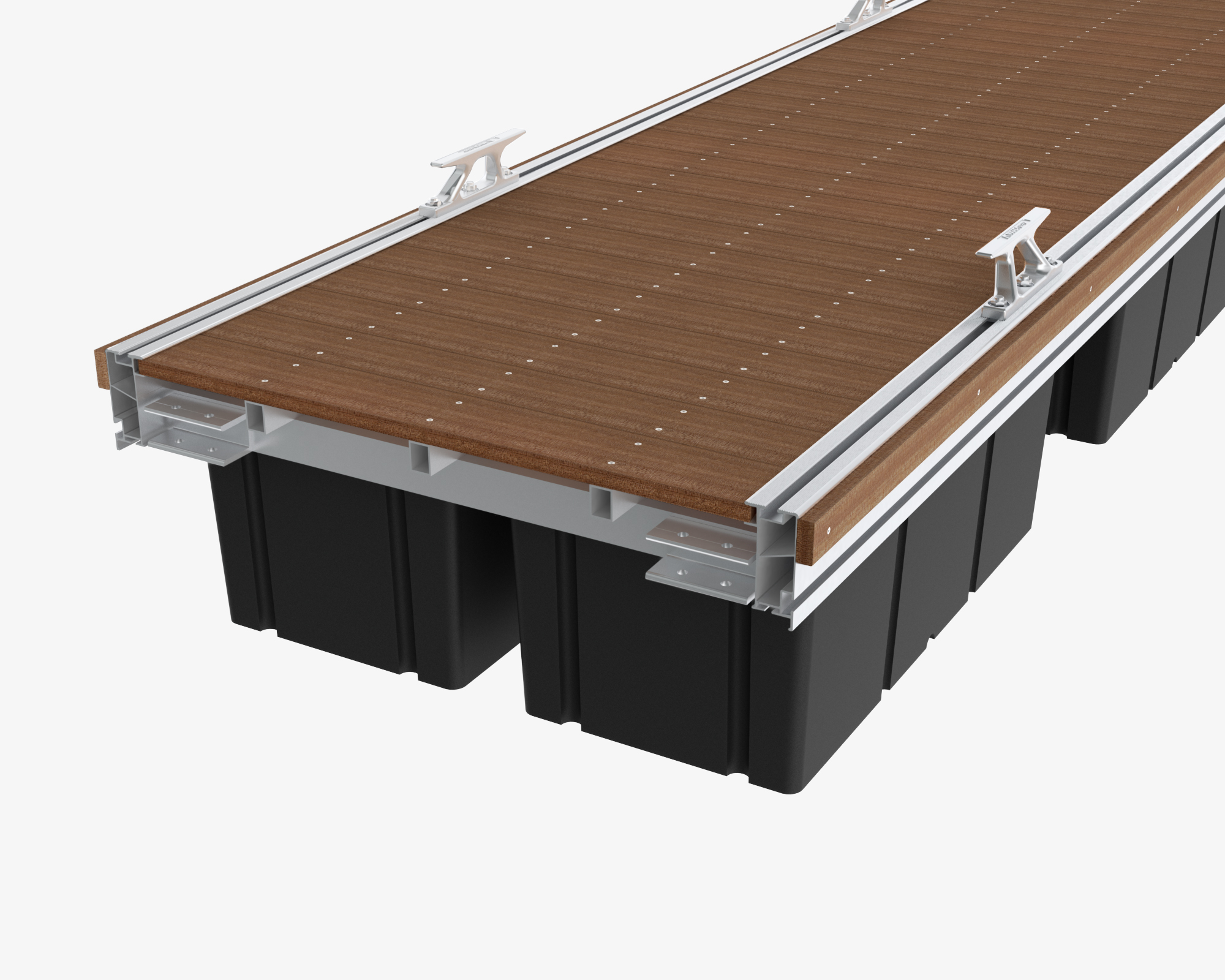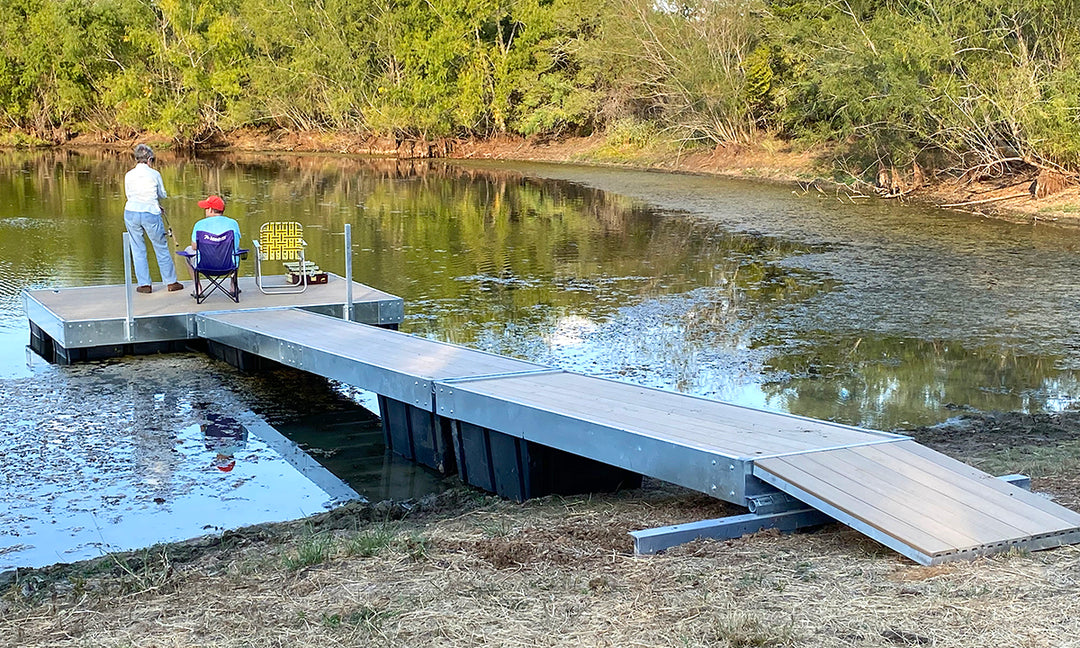The Ultimate Guide to Picking the very best Floating Docks
Choosing the optimal floating dock requires a thorough understanding of numerous components that influence both performance and long life. Elements such as dock types, materials, and vital features significantly affect your decision-making procedure.
Recognizing Floating Dock Types
When selecting a drifting dock, it is vital to recognize the numerous types offered, as each offers distinct purposes and applications. Floating docks mostly fall under three classifications: modular, fixed, and pontoon docks.
Modular docks are composed of individual sections that can be quickly set up or reconfigured, making them perfect for changing water degrees and diverse uses, such as recreational tasks or commercial operations. Their adaptability permits for personalization based upon particular demands.

Pontoon docks are identified by their buoyant structure, usually made up of multiple pontoons that provide security and assistance. They are especially well-suited for larger vessels and are generally used in marinas or for waterside residential or commercial properties. Comprehending these kinds aids in selecting one of the most appropriate floating dock to meet certain requirements, guaranteeing ideal capability and safety and security.
Key Products for Longevity
Picking the appropriate materials for floating docks considerably impacts their sturdiness and durability. The most usual products consist of wood, plastic, steel, and composite materials, each offering distinct benefits and limitations.
Timber, commonly favored for its visual allure, needs regular upkeep to stand up to wetness and degeneration. Pressure-treated lumber can enhance resistance to rot, yet it may still be vulnerable to pests and weathering.

Plastic docks, made from high-density polyethylene (HDPE), are resistant to rust, UV radiation, and impact, making them a popular option for coastal environments. Their light-weight nature additionally helps with easy setup and moving.
Steel docks, normally created from aluminum or galvanized steel, provide outstanding toughness and toughness. They are immune to corrosion, specifically when treated, however might call for additional insulation to avoid warmth accumulation in hot climates.
Composite materials, combining wood fibers and plastics, deliver the benefits of both timber and plastic, standing up to moisture and fading while calling for minimal upkeep. - floating dock builder
Inevitably, the option of products must straighten with environmental conditions, intended usage, and upkeep choices to make certain the floating dock remains practical and cosmetically pleasing in time.
Crucial Functions to Consider
While the choice of products is vital, thinking about essential features for floating docks is equally important to make certain optimal performance and individual fulfillment. One essential attribute to analyze is the dock's buoyancy ability, which figures out exactly how much weight it can support without submerging. floating dock builder. This is crucial for fitting boats, individual watercraft, and also entertainment tasks
Furthermore, mobility is a substantial consideration. Relying on your requirements, you might want a dock that is very easy to deliver and disassemble, specifically if you plan to move it seasonally. Security is another important attribute; a properly designed floating dock should decrease motion Discover More triggered by wind and water currents, providing a secure system for users.
Safety and security features, such as non-slip surface areas and rounded sides, are additionally vital to avoid crashes, especially in wet conditions. Additionally, take into consideration the accessibility of accessories, such as cleats, bumpers, and ladders, which can boost the functionality of your dock.
Installation and Upkeep Tips
Establishing and preserving a floating dock requires mindful preparation and focus to information to ensure its longevity and ideal efficiency. Begin by selecting an ideal area that decreases direct exposure to solid currents and waves, which can create wear and tear. Ensure that the water depth suffices for the dock's elevation which it is secured safely to avoid movement.
During installation, comply with the producer's standards carefully, as inappropriate setting up can compromise stability. Use here high-quality products immune to corrosion, such as light weight aluminum or treated timber, to improve resilience. Routinely examine all elements, including floats, connectors, and anchoring systems, for signs of damages or wear.
Maintenance is critical for expanding the life of your dock. Clean the surfaces occasionally to stop algae buildup and check for any type of loose fittings that may need firm. If your dock uses flotation protection gadgets, guarantee they continue to be undamaged and totally free from slits. Additionally, take into consideration using protective layers to wooden parts to minimize weathering impacts. By adhering to these installation and maintenance ideas, you can enjoy a trustworthy and useful floating dock for several years ahead.
Budgeting for Your Dock
Budgeting for your dock is a vital action that can considerably affect your general complete satisfaction and financial investment in a waterside residential property. Establishing a clear budget plan aids you navigate the various choices available and guarantees you make educated decisions that straighten with your financial abilities.
Begin by establishing the dimension and layout of the dock you call for, as these elements will considerably affect the cost. Floating docks can differ substantially in price, relying on products, buoyancy, and functions like devices and ramps. Research study various manufacturers and vendors to contrast rates and recognize the marketplace worth.
Along with initial costs, consider continuous expenditures such as maintenance, insurance, and possible repair work. Allot funds for these persisting expenses to prevent surprises down the line. It's also sensible to budget plan for any needed permits or examinations, which might be needed by regional guidelines.
Last but not least, maintain in mind the potential return on financial investment. A well-planned dock can enhance your residential or commercial property's value and appeal, offering a favorable financial influence in the long-term. By budgeting efficiently, you can ensure that your dock satisfies your requirements without jeopardizing your economic stability.
Final Thought
In final thought, choosing the suitable floating dock requires an extensive examination of numerous factors, consisting of dock types, materials, vital functions, and setup processes. Cautious factor to consider of budgetary restraints will even more guarantee an audio investment.

While the selection of materials is important, considering crucial attributes for floating docks is just as essential to make sure optimum efficiency and customer satisfaction.Establishing up and maintaining a drifting dock requires careful planning and attention to detail to guarantee its durability and ideal efficiency. Floating docks can differ significantly in price, depending on materials, buoyancy, and features like ramps and devices.In verdict, picking the excellent floating dock requires a detailed analysis of numerous variables, consisting of dock types, products, necessary features, and installment processes.